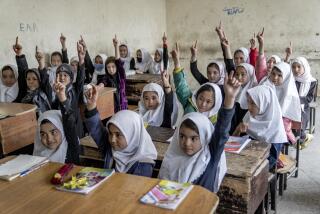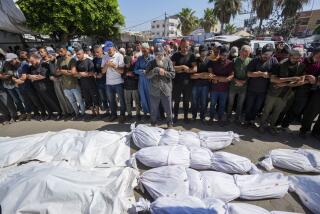Rudimentary education
- Share via
MINGORA, PAKISTAN — The classroom swelters in 102-degree heat. The students, all boys in first and second grade, wipe the sweat off their faces as they bark out a spelling exercise in unison.
“A-P-P-L-E, apple! B-O-X, box! M-O-N-K-E-Y, monkey!”
School is back in session for the children of Swat, the verdant, mountainous valley that this year became the prime battlefield in the Pakistani military’s bid to neutralize local Taliban groups. After more than two months of fighting, soldiers regained control of Swat’s major towns, and thousands of refugees who fled the conflict have been returning home.
Yet in many towns, classes are now being held in unventilated canvas tents, with a tarp for a floor.
The Taliban upended virtually every aspect of Swat society in the last two years, and one of their biggest targets was education. The Islamic militants bombed or set fire to 230 of Swat’s 1,600 public and private school buildings, taking special aim at girls’ education, at times banning girls from attending school. No religious madrasas, on the other hand, were destroyed.
At this school in Mingora, six white canvas tents act as classrooms, stretching over the sharp rubble of what used to be a red-brick public high school and elementary school.
The students fidget on the blue tarp, shoulder to shoulder in their white and beige tunics. They have no desks, chairs or blackboards, and won’t be getting them any time soon, their teachers say.
For that matter, there isn’t a bottle of drinking water or a toilet in sight.
“Education in tents is a joke,” said teacher Ibrahim, 40, who, like some Pashtuns, goes by one name. “There are no blackboards here, no electricity, no fans. If we’re stuck in this heat, how can the kids concentrate?”
In Mingora, the region’s largest city, traces of normality are creeping back into the everyday routine. Markets are bustling again, police are back on the streets and even the Internet is available.
Yet “it’ll take a year to rebuild a school, so they’ll be in tents for a year,” Parwanas Khan, a Swat elementary and secondary school official, said during a visit to one of the makeshift schools. “Right now, there are no other resources for these kids.”
Even some of the schools still standing are not available: They have been commandeered by the Pakistani military to use as bases.
Students who do have a school to go to face other problems. In Mingora, most children had long relied on the city’s large fleet of converted motorcycle rickshaws to get to class. But the government has now banned use of the swift vehicles, concerned that militants could use them to carry out bombings.
Private schools, which rely on tuition from parents, are also in dire financial shape because of newly imposed morning and evening curfews in Mingora. The curfews are in place as a security measure, but they severely constrain the local economy, making it difficult for parents to earn enough to pay private school fees, said Zia Uddin Yousafzai, principal of a private school.
Perhaps the biggest obstacle to the resumption of education is the overriding fear many parents have that the fighting isn’t over yet. Skirmishes between Pakistani troops and Taliban militants flare up repeatedly.
The week before school resumed in Swat on Aug. 1, the decapitated body of a local police officer was found in a town near Mingora. And last week, militants set fire to nine schools in the neighboring district of Buner, education and police officials said.
At an elementary and high school in Morgora that was razed by the Taliban in January, the combined enrollment had been 540. On opening day this year, only 30 children showed up.
“Parents aren’t likely to send their kids here, because they’re not expecting peace to last,” said the principal, Faisal Aziz.
Parents weigh such fears against a yearning for their sons and daughters to make up for lost time. Sher Mohammed’s 15-year-old daughter missed a year because of Taliban-imposed edicts banning girls from attending school.
“All of the girls were so sad,” said Mohammed, standing on the site of his daughter’s school, which is now a mound of rubble in the heart of Mingora. It was bombed by the Taliban on Jan. 19. “They felt like they were being denied an education so that they would be raised like animals, like illiterates,” he said.
Mohammed’s daughter has returned to school; she and schoolmates from Mingora’s Girls School No. 1 now share a tiny school with grade-schoolers.
Another student there, Rabia Faisal Rehman, 18, said that during the year that she could not attend school, she hunkered down at home with a stack of physics, chemistry, math and biology textbooks.
“There’s still a lot of fear here, among everyone including me, that the Taliban may come back,” Rehman said. “But we are ready to continue our studies, and we’re ready to do it in any environment, even if we have to sit on mats.
“I want to be an educated girl,” she said. “I want to become a doctor.”
--
More to Read
Sign up for Essential California
The most important California stories and recommendations in your inbox every morning.
You may occasionally receive promotional content from the Los Angeles Times.













